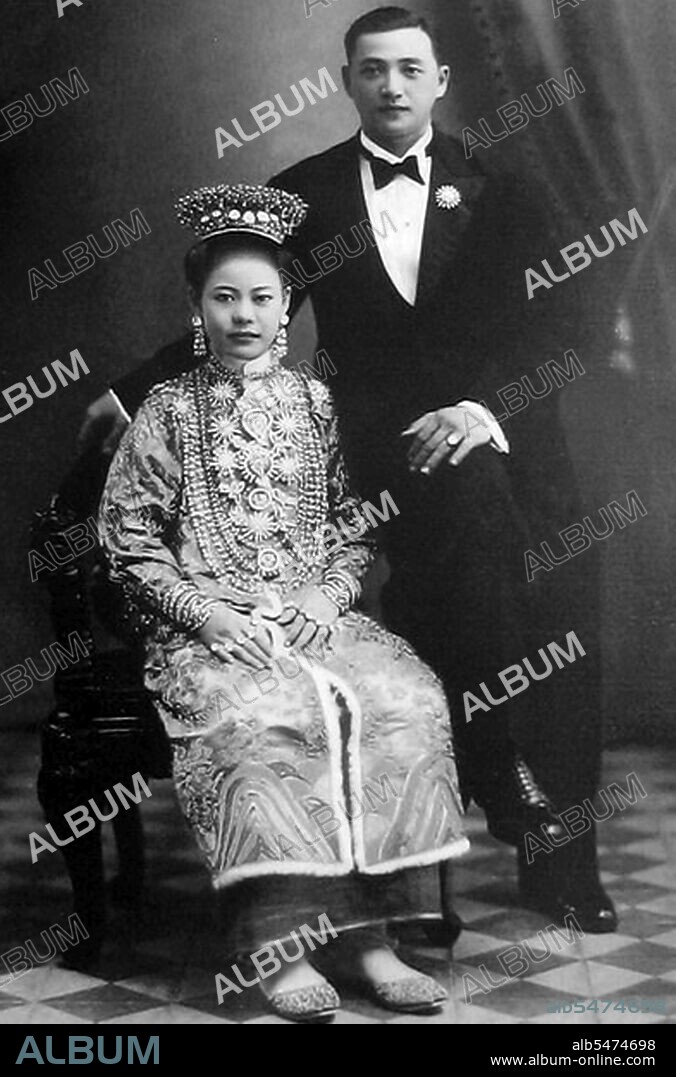alb5474698
Malaysia: A Peranakan bride and groom, Penang, early 20th century

|
Ajouter à une autre Lightbox |
|
Ajouter à une autre Lightbox |



Avez-vous déjà un compte? S'identifier
Vous n'avez pas de compte ? S'inscrire
Acheter cette image

Titre:
Malaysia: A Peranakan bride and groom, Penang, early 20th century
Légende:
Voir la traduction automatique
Peranakan Chinese and Baba-Nyonya are terms used for the descendants of late 15th and 16th-century Chinese immigrants to the Indonesian-Malay Archipelago during the Colonial era. Members of this community in Melaka identify themselves as 'Nyonya Baba' instead of 'Baba-Nyonya'. Nyonya is the term for the women and Baba for the men. It applied especially to the ethnic Chinese populations of the British Straits Settlements of Malaya and the Dutch-controlled island of Java and other locations, who had adopted partially or in full Malay customs to become somewhat assimilated into the local communities. In colonial times they were an elite in Singapore, Melaka and Penang, identifying strongly with the British administration. Most have lived for generations along the Straits of Malacca. They were usually traders, the middleman of the British and the Chinese, or the Chinese and Malays, or vice versa because they were often educated in English. Because of this, they almost always had the ability to speak two or more languages. In later generations, some lost the ability to speak Chinese as they became more fully assimilated into the Malay Peninsula's culture and started to speak Malay fluently as a first or second language. While the term Peranakan is most commonly used among the ethnic Chinese for those of Chinese descent also known as Straits Chinese (named after the Straits Settlements), there are also other, comparatively small Peranakan communities, such as the Indian Hindu Peranakans (Chitty), Indian Muslim Peranakans (Jawi Pekan) and Eurasian Peranakans (Kristang or Christians).
Crédit:
Album / Pictures From History/Universal Images Group
Autorisations:
Modèle: Non - Propriété: Non
Questions sur les droits?
Questions sur les droits?
Taille de l'image:
3368 x 5100 px | 49.1 MB
Taille d'impression:
28.5 x 43.2 cm | 11.2 x 17.0 in (300 dpi)
Mots clés:
ART POPULAIRE INDONESIEN • ASIE • ASIE, CONTINENT • CEREMONIE DE MARIAGE • CHINE • CHINOIS • CHINOISE • CONCLUSION DE MARIAGE • CONTINENT ASIE • EQUITATION: VALET • FAMILLE, MARIEES • FIANCEE • HISOIRE • HISTOIRE • INDONESIE • MALAISIE • MARIAGE (NOCE) • MARIAGE MARIEE • MARIAGE • MARIAGES • MARIÉE • MARIEES • NOCE • PALEFRENIER • SACREMENT MARIAGE • SINGAPOUR • THAILANDE • VALET
 Pinterest
Pinterest Twitter
Twitter Facebook
Facebook Copier le lien
Copier le lien Email
Email
